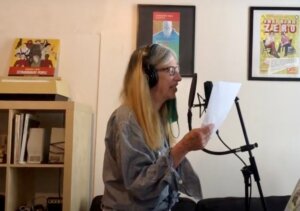In the words of the Torah and the music of Toto and Peter Gabriel, now is the season of renewal
Musician Michael Hearst’s ’80 From the 80s’ project delves into the Talmud of pop music

Michael Hearst and Allyssa Lamb Photo by Bill Wadman
We address many of our prayers, especially at this time of the year, to “Eloheinu v’elohei avoteinu” — Our God and God of our ancestors. In so doing, we acknowledge that in every generation we both appreciate our received heritage from our ancestors but also build the culture anew ourselves.
The new project by Michael Hearst, famous for his indefinable klezmer Lit Rock duo One Ring Zero, grapples with how to do both of those things: receive and renew. Instead of using the Tanakh or the Talmud as sources, though, he is employing the diverse arcana of 80s pop. To execute this very particular project, he has enlisted bandmate Allyssa Lamb, long time friend Claudia Gonson (from The Magnetic Fields, Harvard and, briefly, law school) as well as such guest vocalists as Gonson herself, Tanya Donelly, Jamie Lenman and Amanda Palmer. The list is growing as more people hear of the project and ask to sing a song.
With “80 from the 80s” Hearst has set himself another set of parameters. Rather than singing recipes verbatim as One Ring Zero did for The Recipe Project, he will publish another 80s cover, every two weeks until he has published 80. When I visited him in his Brooklyn studio, he called it “my own deep dive of self-inflicted 80s-ness.” Those bi-weekly releases will continue for about three years.
Fittingly, that will take Hearst to the year of his son’s bar mitzvah. As he approached the end of his four-book soundtrack project (Unconventional Vehicles, Curious Constructions, Extraordinary People, Unusual Creatures) and wondered what would be next, he realized that both he and his son always seemed to be answering the car music question the same way. “The 80s” was always the answer to: “Which decade should we listen to?”
Hearst and bandmate Allyssa Lamb started playing around with a couple of songs to see what was under the hood and how he could tinker with them. He tried a less heavily produced version of Toto’s “Africa,” using more African rhythm. But they remained unconvinced. It was only when they took Matthew Wilder’s egregiously annoying 1983 hit “Break My Stride” and imbued it with a newfound quirkiness, that they thought they had something.
“I like that better than the original!” his son said.

Having one Hearst junior’s approval as well as the enthusiastic encouragement of 80s stan Gonson — Hearst began soliciting singers. Hearst has a patreon account so that listeners can support him, but generally this project is done, like Torah Lishmah, just for its own sake. “If a song gets picked up and licensed, we’ll split the proceeds, but mostly we’re just doing it out of love for the songs.”
In part, the project is an homage to Hearst’s own childhood. When he was growing up in Virginia Beach, the music on radio station K94 was “the art that there was,” he said. ”Music was at the heart of ‘80s culture and identity in a way that it no longer is”; there was a “concise repertoire” of songs that everyone heard on the radio, or at the “roller skating rink.”
For a musician who has been a composer for most of his working life, whether film music or with his bands, it’s been a challenge to rework other artists’ songs. But for folks who grew up with the iconic version of the song, there’s no point in trying to recreate it. Tanya Donelly (Throwing Muses, Breeders, Belly) wanted to sing the Yazoo song “In My Room” from their seminal Upstairs at Eric’s album. It’s a deep cut but one that I have loved since my own bar mitzvah. Instead of the samples that Vince Clarke cut into the original, Hearst cut in audio samples of his son as a young child pointing things out around his room.
After talking a little bit about the music Hearst was trying to orchestrate — “‘Sledgehammer’ was a beast!” — I asked him whether there was anything that characterized 80s music. Hearst speculated that, compared to today, it was “less dark” in a “sound palette, way, you know, like it wasn’t so much droning, distorted guitars and stuff.” But, as we discussed what made 80s music culture different — New Wave, MTV, electronic drums — we had to interject caveats into everything. Even though there was less music produced, and it wasn’t distributed universally through YouTube, Spotify and their ilk, people were already trying a whole load of different, new things.
Hearst told me he’s excited that Olivier Conan, the singer and charismatic owner of Barbès, has just signed up to do a version of Nena’s “99 Red Balloons.” Clearly, in his mind, there were whole sets of European experiences of the 80s that Hearst would love to learn about, and Nena stands at the gateway. And Europe’s just the beginning, it could be anyplace in the world.
“The thing I’m having most fun with is the wild card of getting to work with people that I’ve never worked with before. I mean, I love collaboration,” he said. “Especially when they’re heroes of mine. So, all of a sudden, finding myself in the studio with them is the coolest ever. You know that to me, is just magical.”
















